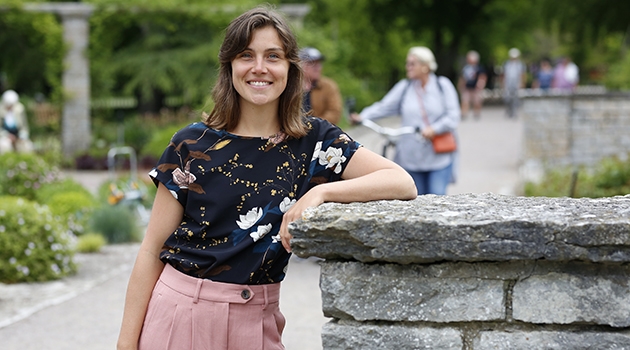Tourism as a tool for sustainable local development
Marije Poort, a PhD student at Uppsala University’s Campus Gotland, is focusing on sustainable destination development. Marije is exploring how people and economic activities such as tourism can leave a positive impact on local communities and the environment.
The Master's Programme in Sustainable Destination Development at Campus Gotland attracts students from all over the world. One of them is Marije Poort from the Netherlands. After completing the Master's programme, she is now a PhD student at the interdisciplinary Graduate School in Sustainability Studies (GRASS), also located at Campus Gotland. Her PhD thesis is about sustainable destination development, more specifically regenerative tourism and innovation within this field. In short, regenerative tourism improves the well-being of the local community by using tourism as a tool. Regenerative tourism contributes to the quality of life of local people – which is strongly connected to the health of ecosystems. It challenges the strong focus on economic growth and instead aims to create an economy of mutual benefit.
“My research aims to understand how innovation can promote sustainable destination development on Gotland, by rethinking the understanding of innovation and simultaneously stimulating it. My goal is to develop concepts, theories and sustainable innovations which can be practically implemented by tourism actors on Gotland,” Marije says.
Lessons learned after the pandemic
Since the outbreak of COVID-19, Marije has been able to explore the impact of the pandemic on the shift to increased sustainability. The pandemic made us reconsider how we travel, sell our destinations and want to spend our time, for example.
“As a result of the pandemic, people and companies have reflected on what they do and how they do it. The pandemic caused a lot of (financial) stress. Many also reveal that they have changed certain activities, such as scaling down or closing earlier, which is more sustainable for themselves and their personal lives,” Marije says and continues:
“It has also made many people aware of the opportunities in their own country or region. So, more people chose holidays close to home, reducing the amount of travelling (and related pollution), but many natural areas came under too much pressure due to the increased number of people visiting them. This brought new challenges to the table. So, we could shift to tourism closer to home, but we still need to consider the protection of these areas.”
Workshops and co-creation labs
Marije uses a method called collaborative research. It mainly means working towards sustainability together with non-academics such as locals and local organisations. In her research this is achieved through workshops, for example, and by setting up ‘co-creation labs’ where people come up with new ideas together and share knowledge.
When working close to tourism operators you need to be more flexible as a researcher, Marije points out. Tourism operators and stakeholders have their daily business activities that you need to adjust to.
“Working with many different people also means being open to and integrating various views and opinions in your research. The goals of stakeholders and the goals of researchers can differ,” Marije says.
Collaboration is crucial
Ulrika Persson-Fischier, a researcher in sustainable tourism and director of the Master's Programme in Sustainable Destination Development, is also interested in collaborative research. Marije is Ulrika’s doctoral student, so they work closely together. According to Ulrika, collaboration is necessary in research on sustainable destination development as well as in many other contexts where people work for sustainability.
able tourism and director of the Master's Program-
me in Sustainable Destination Development.
Photo: Daniel Olsson
“Destination development is not something that researchers can achieve by themselves. There are people, organisations and companies working with it, and they have to be involved in the research if you want to achieve any results,” Ulrika says and continues:
“It is vital to involve the actors in the actual design of the research project. Both to be sure that the researchers focus on the right things, but also to create the motivation and commitment needed to work for sustainability. An important dimension in this research is to find ways of working that make people, companies and organisations – the only ones who can achieve sustainability – want to be involved. It is essential to find innovative means of working for sustainability and not just focus on the goals.
Marije – you study tourism on Gotland, but can your research also be useful in other parts of the world?
“Research does not always have to be generalisable. Especially regarding sustainable development – the local and specific context is key. So, my main focus is Gotland. But as I am very interested in regeneration and regenerative tourism, I hope to contribute to its more general theoretical understanding and perhaps some general practical applications.”
And finally, what do you – Ulrika – think Marije's research can lead to?
“Marije is focusing on many local initiatives that already exist to support and develop the local communities around Gotland. Her project focuses a lot on achieving destination development that local communities can control themselves and will benefit from. You always hope tourism around the world will benefit the local population, but unfortunately, this is far from the reality. Marije's research can contribute to understanding the mechanisms that determine the result and, more concretely, contribute to sustainable destination development on Gotland.”
Caroline Holmbom
Master's Programme in Sustainable Destination Development
The Master's Programme in Sustainable Destination Development is held at Uppsala University's Campus Gotland in Visby, one of the most popular tourist destinations in the Nordic countries. This international programme offers committed researchers and lecturers in a wide range of subjects – all with a sustainability perspective. The programme prepares students for work with sustainable destination development in tourism-intensive regions around the world. It leads to a Master of Science (120 credits) with sustainable destination development as the main field of study.

